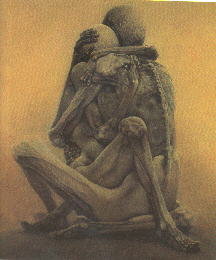

Catastrophism
From the premonition of the catastrophe to the fulfilled Apocalypse. The early poems of the poet - especially those coming from his first two volumes: "A Poem on frozen time" and "Three winters" are catastrophical in their mood.
Catastrophism - from Greek: katastrophe - upheaval, a turning point, is the intellectual attitude characterized by fear of inevitable extermination (annihilation): the present world is in danger. So too are individual human beings, values, culture and civilization. The representatives of catastrophism in Polish literature are: Krasiński (the question about the sense of history), Kasprowicz, Witkiewicz (civilization will be the cause of cultural extermination), Baczyński (the extermination of generation), Konwicki (the extermination of values), Czechowicz (war).
The poems are full of the mood of threat and fear, they present apocalyptical visions. The poetical pictures present the world plunged into oblivion (forgetfulness); time and history stop.
The poem "Statue of a Couple" originates from one of the first Miłosz's volume: "Three Winters". We have to remember that this poem was written three years before the beginning of the Second World War and we can feel the depressing mood.
This page, in its earlier 1997 version (use right mouse to open in new window), was created by Aleksandra Kolodziejczyk, Iwona Kowalska, and Dariusz Plygawko, students of the Fifth General Education Liceum in Bielsko-Biala. Marcin Tomana and Piotr Kowalski of the School's Informatics faculty and Urszula Zajaczek of the Polish Language faculty, acted as advisors. Linguistic editing of current version by Agata Dybel and Peter K. Gessner.STATUE OF A COUPLE (Three Winters)
Your hand, my wonder, is now icy cold.
The purest light of the celestial dome
has burned me through. And now we are
as two still plains lying in darkness,
as two black banks of a frozen stream
in the chasm of the world.
Our hair combed back is carved in wood,
the moon walks over our ebony shoulders.
A distant cockcrow, the night goes by, silent.
Rich is the rime of love, withered the dowry.
Where are you, living in what depths of time,
love, stepping down into what waters,
now, when the frost of our voiceless lips
does not bar access to the divine fires?
In a forest of clouds, of foam, and of silver
we live, caressing lands under our feet
And we are wielding the might of a dark scepter
to earn oblivion.
My love, your breast cut through by a chisel
knows nothing any more of what it was.
Of clouds at dawn, of angers at daybreak,
of shadows in springtime it has no remembrance.
And you have led me, as once an angel led
Tobias, onto the rusty mashes of Lombardy.
But a day came when a sign frightened you,
a stigma of golden measure.
With a scream, with immobile fear in your thin hands
you fell into a pit that ashes lie over,
where neither northern firs nor Italian yews
could protect our ancient bed of lovers.
What was it. what is it, what will it be -
we filled the world with our cry and calling.
The dawn is back, the red moon set,
do we know now? In a heavy ship
A helmsman comes, throws a silken rope
and binds us tightly to eaah other,
then he pours on friends, once enemies,
a handful of snow.
Wilno, 1935
| Info-Poland a clearinghouse of information about Poland, Polish Universities, Polish Studies, etc. |
